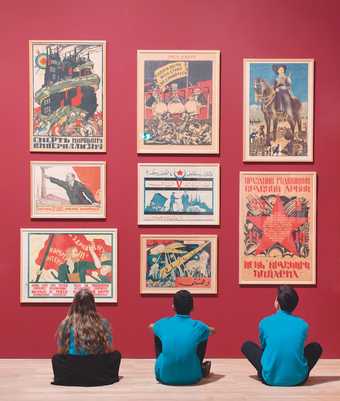
Pupils from Thomas Tallis School, south east London sit in front of revolutionary posters at the Red Star Over Russia exhibition at Tate Modern, November 2017
Photo: Malcolm Park/Alamy Live News
Can it really be the case that the government is trying to produce a generation of state-educated children who are less articulate, less confident, less imaginative and less creative than their predecessors? If so, the schools minister Nick Gibb is going about it the right way. In the face of all the evidence, he claims that the curriculum is not ‘driving the arts out of education’. Yet school timetables are being relentlessly narrowed to a diet of GCSEs in science, technology, engineering and maths. These so-called STEM subjects – together with English, an ancient or modern language, and history or geography – constitute the EBacc, the English baccalaureate, which the government intends to be taken by 90 per cent of secondary school pupils by 2025.
No one questions the value of these subjects, but the arts are excluded from the EBacc. Under an oppressive regime of targets, tables and testing, schools are cutting back on the teaching of art, design, music and drama. There are 16 per cent fewer arts teachers, with a corresponding fall, year on year, in the number of pupils taking arts subjects. Last year, 50,000 fewer GCSEs in arts subjects were taken, a fall of 10 per cent. A-level subjects such as music and drama may disappear. Shockingly, the Russell Group, representing 24 top universities, includes no arts A levels, other than English, in their list of subjects that applicants would benefit from taking.
The government appears to be deaf to pressure groups like the Cultural Learning Alliance, but now they must listen to the voices of those most at risk from this unfortunate social experiment. Tate, the Royal Shakespeare Company and the University of Nottingham have recently released the results of research analysing the responses of 6,000 young people aged 14 to 18 to their practical engagement with the arts. This was a serious, three-year project, and the students and their teachers make it abundantly clear just how important the arts are to their intellectual and emotional development. Appropriately, the report is called ‘Time to Listen’.
What these young voices tell us is that, far from being ‘soft’, arts subjects are academically rigorous and intellectually demanding. They also develop social skills, encouraging self-expression and teamwork. Few may become professional artists, dancers, actors or musicians, but they will become confident, emotionally intelligent human beings. And they will be a discriminating audience for those who do.
What is astonishing is that a government that appears to be killing creativity in schools is, at the same time, busy boosting the creative industries with its new industrial strategy. The creative industries, which depend on the human resources of imagination, expressivity, verbal and visual skill, are worth over £90 billion a year to the economy. But where are these resources going to come from if the rising generation of young people are unable to develop their creativity?
The voices in the report are calling for a change in the way school performance is measured, with arts and culture as an educational entitlement. They say that Ofsted needs to ensure a balanced, arts-rich curriculum, and that there should be an arts and culture premium for all children. Russell Group universities need to drop their apparent contempt for arts subjects. The pay and status of teachers who work as ‘arts brokers’ must be enhanced.
The irony is that private schools fully recognise the value of the arts in education. They are building theatres, founding orchestras and encouraging creativity. Government ministers must know this, since so many send their own children to these schools. But state-educated children have few such privileges, and ministers seem determined to make sure that they don’t.
For more information on the Time to Listen report, visit the Tracking Arts Learning and Engagement (TALE) website at researchtale.net.
Robert Hewison is a historian of British culture. His latest book, Ruskin and His Contemporaries, is published by Pallas Athene.
